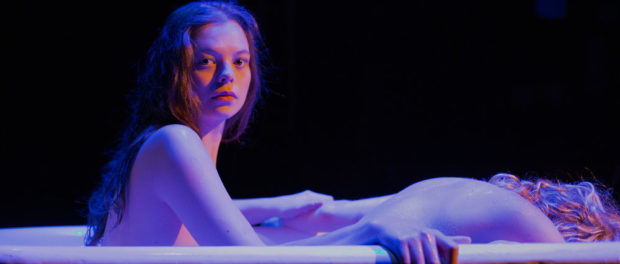Talking Tragic Queens with Rhiannon Collett
With the Wildside Festival starting in just days, I had a chance to speak to the writer of Tragic Queens, Rhiannon Collett, who was the artist in residence for Cabal Theatre. As it turns out, Collett didn’t write the piece by labouring away in private for months. Instead, the entire show is a devised creation where everyone from the director (Anthony Kennedy) to the costume designer (Sophie El-Assaad) to the actresses (Meagan Schroder, Jillian Harris, Alex Petrachuk) to the sound designer (Devon Bate) to the playwright to the dramaturg (Kate Stockburger) works together to put together the production. Each takes direction and advice from the others, no matter what role they have. “It’s a non-hierarchical way of working,” says Collett, who functioned as the playwright. “I’m a coffee filter. Everyone is the coffee, and I am both the coffee and the filter.”
To devise the work, the entire production company got together and read critical theory as well as engaged in different activities like object puppetry and journaling over a period of weeks. “One rehearsal was spent reading academic texts,” says Collett. After three weeks of exploration, each person involved focused on a specific role to shape the piece. Stockburger and Collett in particular headed off to coffee shops to do the hard work of writing the script.
“We had hard conversations about being queer and being girls and how to exist in our bodies and in our world. We’d be writing, crying, smoking. It was really dramatic,” Collett says. “I never want to work any other way again.”
Een when the company had divided the labor, contributions still came from the group. “We had a giant Google Doc spreadsheet of the things people had thought of,” says Collett. “There were about 100 things on the list and I got to go through and decide where I’d work each part into the script. Meagan [Schroder] wanted a lip sync, and I had to figure out where to put a lip sync. It was like putting puzzle pieces together.”

Tragic Queens. Photo photography by Laurence Philomene
One advantage of the method is that it allowed breakthroughs to come from different people. “It’s usually lonely to be a writer, to be thinking about your weird stories” says Collett. She recalls how at one moment, she was griping about how the script wasn’t working to Stockbridge when the costume designer, El-Assaad, suggested that one of the characters be pregnant. “I saw her suggestion in the Google Doc and started crying. ‘That’s it! That’s the pinnacle. That’s a way of summing it up!'”
Tragic Queens isn’t just unique for its mode of creation. The show is a collage of the lives of three girls who are visited in childhood, during the time of adolescence, and as adults. “There’s a whole part that’s non-verbal,” explains Colett. “We brought a choreographer in for that. The teen portion is a sound clip mashup, with lip syncing and glitter. The end is a performance of adulthood.” The characters are based on the ones found in Three Girls in the Waves by Virginia Wolfe. “They’re like time travellers,” says Collett, “They’re stuck in a perpetual state of girlhood.”
According to Colette, girlhood, or the idea of girlhood, was a key conversation topic during the play’s creation. “We talked a lot about what it means to be a girl and a queer girl as well. I don’t mean girl as in having a vagina, either. Girlhood and femininity are a specific way of existing in the world.”
Another element of the show is an exploration of the complexities of feminine friendship. Collett elaborates, “What does it mean to grow up with other female friends? Girls can be cruel to each other and loving at the same time. I find there’s a really beautiful nuance in how young girls can behave, both beautiful and painful. You’re growing up in a system that tells you to hate yourself and then enacting that on other girls.”
In particular, the two queer girls of the play are in and out of love for the entire play. “You see how that love is undercut with a deep hurt,” says Collett.
“I trust these people so much,” says Collett. “I love writing for them. It just gives and gives and gives. I wrote some risky stuff in this play like the scene where they are naked in a bathtub together. It’s an uncomfortable scene where they’re reciting lines from Sappho. They’re just like, ‘Let’s do it! Of course we’ll do it!’ As a writer, as a playwright, having people act out your words with their bodies, to be vulnerable on stage, is such an honour. It’s such an honour to do that and get to see it.”
Tragic Queens is at the Wildside Festival at the Centaur Theatre (453 ST. Francois Xavier) from January 4 to January 13. Tickets HERE. You can read our interview with Kate Stockburger HERE.






